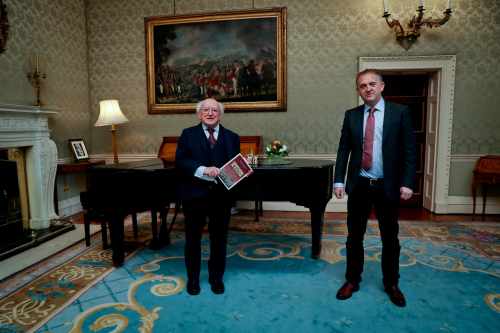Sabina Higgins speech at the National Women’s Council of Ireland Soapbox 2015
Central Bank, Temple Bar, Dublin Saturday, 7th March, 2015
Good afternoon, Happy Internationals Women’s Day everyone. This is just a great way to celebrate – it here in the centre of Dublin – in public – in the open air (if a bit over-shadowed by the bank).
I would like to thank Women’s International Council for providing this opportunity again this year.
This is such an important year – it is 20 years on from the UN Beijing Women’s Conference and the Platform for Action which was successful. Now the UN Women have set the global GREAT GOAL of full equality for women – complete gender equality by the target date of 2030.
That gives us fifteen years and is a mammoth task. There is so much to be done as at the International level we strive to end poverty globally by ending the extreme global inequality.
It is only through the recognition that by the full and equal participation of women in every aspect of society – political, social and economic that development and progress can be brought about.
There are so many aspects to achieving full equality for women that I’m sure many other speakers will deal with. Amongst all the inequalities that persist between men and women, the one I want to prioritise is that of gender-based violence – a form of violence that constitutes a breach of the fundamental right to life, liberty, security, dignity and both the physical and mental integrity of women.
We have come a long way, in Ireland, to being able to address publicly, as matters of collective concern, the issues of domestic violence, sexual abuse and sexual violence.
Thanks to the determination of so many women’s groups and others throughout Ireland, domestic violence and sexual violence have progressively acquired the levels of progressive recognition they deserve. Victims are more willing to come forward and seek support; rape, sexual agues and domestic viol3ence are now acknowledged for what they are – that is, crimes of the gravest sort.
Yet the number of incidents recorded across Ireland attests to the persistence of these crimes. We must continue to use every means we have at our disposal, to tackle gender violence and redress the devastation it causes to the lives of too many women and children. We must do everything we can, to ensure that these women and children are enabled to emancipate themselves from the effects this violence has on their entire existence – that they are enabled to lead lives where personal integrity, hope and meaning are restored.
Addressing gender violence is urgent – the extent of it globally is more than a cause for concern. It constitutes a crisis.
Gender-based violence is very much a global issue. The scale of the problem in many counties around the world remains daunting, whether it takes the form of domestic violence, rape, sexual harassment, sexual violence during armed conflicts, forced marriages, trafficking women, forced prostitution – the list is sadly very long.
Gender Violence is a worldwide problem and is particularly detrimental to a country that has a macho culture. On my visits abroad with the President is where I realised what a detrimental effect it has on the lives and the development of people and their economy.
Where there is extreme inequality and extreme poverty there is sexual violence.
But I also saw the great impact brought by advanced legislation where women are made aware that it is illegal and they can seek help.
A most wonderful solution I saw was in El Salvador – in Ciudad Mjjeres – “a city for women” where sexually violated girls and women find not only help and security but are offered opportunities for training and for independence in the economy and in society.
During our visit to Africa, we were deeply moved by the experience of women and young men we encountered in places such as the Diepsloot Township in Pretoria were violence of all kind sis in sad need of remedy. We were introduced to a number of projects funded by Irish Aid which focus on protecting women from domestic and sexual violence. Many of these projects involved education initiatives aimed at young people and at men.
There was real recognition that the problem needed the involvement of men if it is to be successfully tackled. Initiatives like ‘africa Men Engage Against Sexual Violence’ and ‘One Man Can’ and courses in facilitors training are hopeful signs.
International research shows that new forms of gender violence are tragically emerging among young people, with new media forms being used to increase pressure on young people and cause abusive and bullying relationships. There is also a rise in non consensual sexual activity among young people.
We need to help young people to develop the self confidence and a sense of their own self worth and their own authenticity so they can enjoy their leisure without intimation and psychological or physical abuse. They must have the power to feel free to choose to give refusal or positive consent to any relationship.
I think the inclusion of philosophy in the educational system would help them to learn to think consciously and develop their moral and ethical authority, and to express and defend their values, and make their arguments positively.
Finally eliminating gender-based violence is a Fundamental Rights Issue and is a necessary step if we are to achieve the United Nations target by 2030.
Advancing all these issues of full equality for women requires all of us to encourage all our citizens to speak out on the particular issue of gender violence and on how all of society will be the beneficiary when women have full equality.

